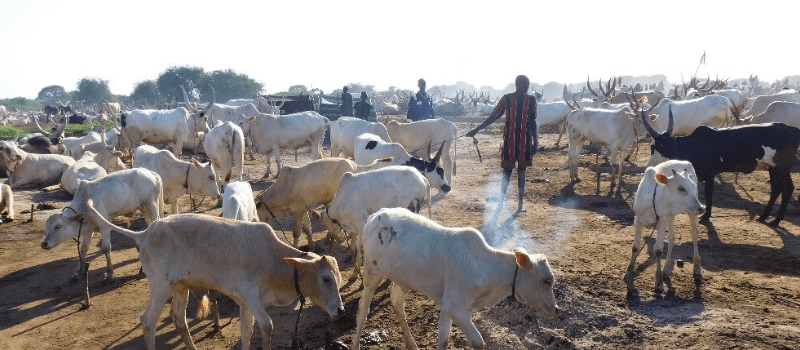This blog describes a vaccination campaign that took place from November 26 to December 11, 2024, protecting over 59,000 livestock in Aweil East, Northern Bahr el Ghazal State. A collaborative effort by VWB, Action Contre la Faim (ACF), and the FAO, this lifesaving campaign helps ensure healthier animals, improved nutrition, and stronger livelihoods for communities dependent on their herds. Written by Tanja Kisslinger, Advocacy and Communications Technical Advisor, VWB.
In South Sudan, livestock are more than just animals; they are lifelines. "When my cows are healthy, my family eats and my children can go to school," shares Kuol, a livestock farmer from Aweil East. His words capture the profound connection between animal health and human well-being in this region. For over 70% of the population, livestock provide not only a source of income and employment but also the foundation for food security. Milk and meat sustain families, while livestock sales enable the purchase of essential goods. Together, they represent an annual economic contribution of over 400 million USD.
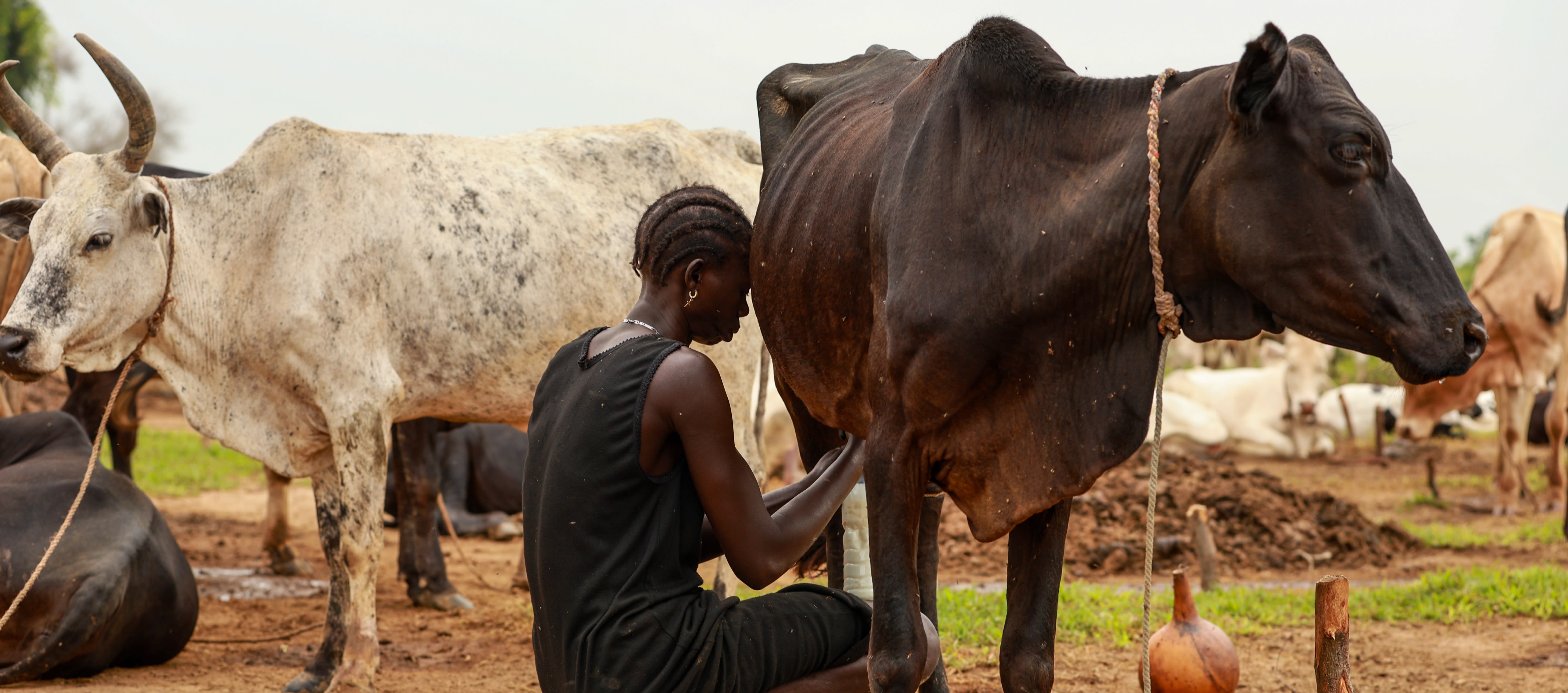 PHOTO: A farmer in Aweil East milks her cow using plastic bottles and traditional jugs—a daily ritual that sustains her family.
PHOTO: A farmer in Aweil East milks her cow using plastic bottles and traditional jugs—a daily ritual that sustains her family.
Yet, despite their critical importance, South Sudan’s livestock face serious threats—from devastating disease outbreaks to inadequate veterinary services and the ravages of climate change. In a region already impacted by irregular rainfall patterns, droughts, and ongoing conflict, protecting these vital assets is paramount. Healthy animals mean better food security, stable incomes, and stronger resilience in challenging environments.
Protecting South Sudan’s Livestock
Recognizing this, Veterinarians Without Borders (VWB), in collaboration with Action Contre la Faim (ACF) and the Food and Agriculture Organization (FAO), has taken decisive action. From November 26 to December 11, 2024, VWB conducted its second mass vaccination campaign in South Sudan’s Aweil East, Northern Bahr el Ghazal State. Over 59,000 animals—including 31,680 shoats and 28,194 cows—were vaccinated against deadly diseases such as Anthrax, Haemorrhagic Septicaemia, Peste des Petits Ruminants, Contagious Bovine Pleuropneumonia, and Sheep and Goat Pox. An additional 41,754 animals received essential treatments.
For families like Kuol’s, this means fewer sick animals and more stable sources of milk and meat—critical dietary staples in times when cereals and other crops are scarce. This campaign contributes to bolstering nutrition, maintaining financial capital for households, and improving overall community well-being.
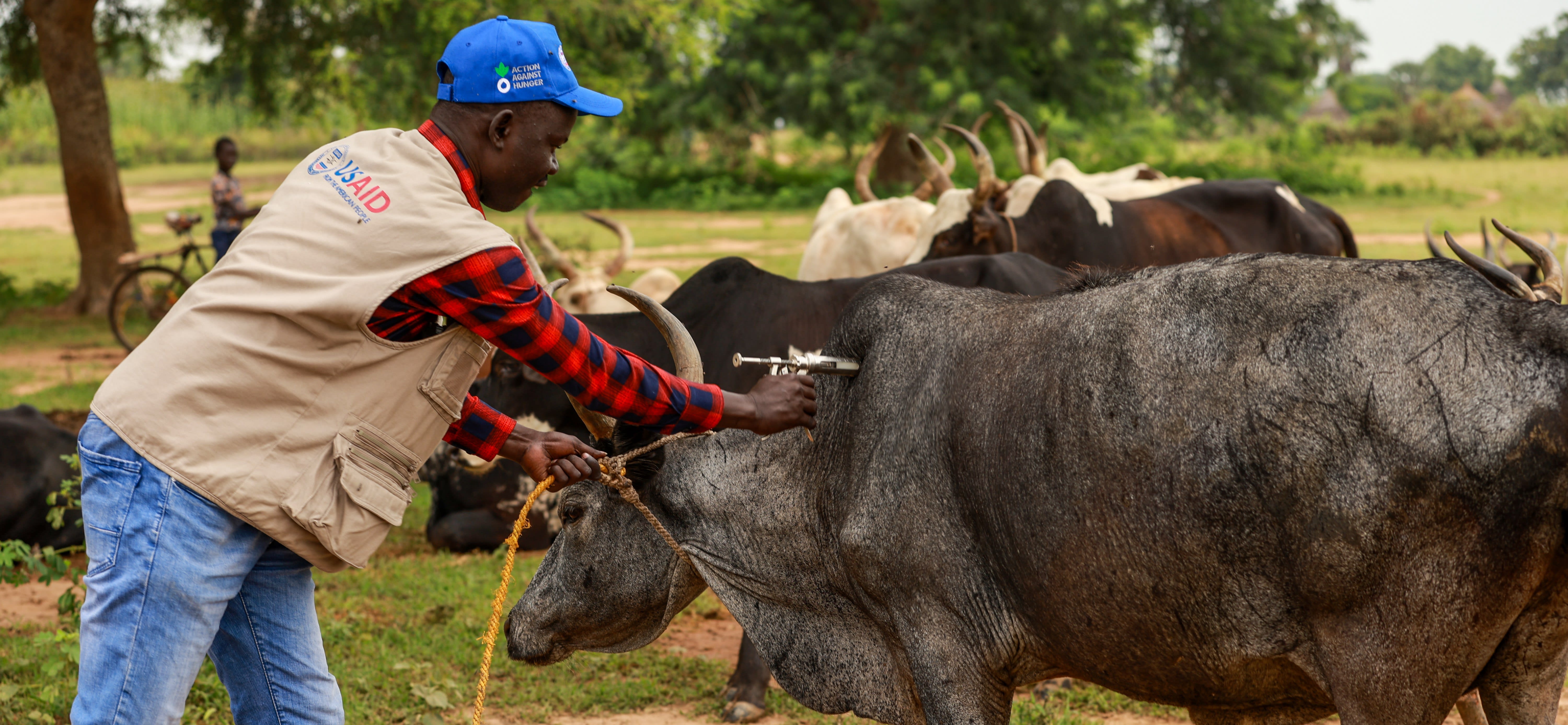 PHOTO: VWB’s Veterinary Doctor Thon Abraham—who led the vaccination campaign—vaccinates a cow in Aweil East.
PHOTO: VWB’s Veterinary Doctor Thon Abraham—who led the vaccination campaign—vaccinates a cow in Aweil East.
The SURGE+MET Project: An Integrated Lifeline
The vaccination campaign was part of the broader, ongoing SURGE+MET project, an integrated emergency response led by ACF and funded by the United States Agency for International Development's Bureau for Humanitarian Assistance (USAID/BHA). Specifically, the project aims to reduce morbidity and mortality from acute malnutrition among vulnerable communities in South Sudan. ACF leads the wider humanitarian response, including nutrition and other emergency services, while the FAO brings its expertise in agriculture and livestock management, ensuring that interventions are aligned with local realities and long-term sustainability. Within this framework, VWB focuses on safeguarding and restoring the livestock herds that families depend on, while also encouraging peaceful cooperation among pastoralist communities. By working together, the project delivers well-rounded, practical support that addresses the deeper causes of hunger and helps families achieve lasting stability.
VWB’s key project activities include strengthening community-based livestock disease surveillance, training Community Animal Health Workers (CAHWs), promoting dialogue in cattle camps to foster peace, and raising awareness about zoonotic diseases. These measures directly address the core needs of communities that depend on healthy livestock for both nutrition and livelihoods.
Empowering Communities Through Local Partnerships
A key component of the vaccination campaign was the active involvement of 40 Community Animal Health Workers (CAHWs), trained and supported by VWB. Among them is Mary, who walks several kilometers daily to reach remote cattle camps. "It’s hard work, but seeing healthy animals and the smiles of their owners makes it worth it," she shares. Her dedication exemplifies the crucial role CAHWs play in bridging gaps in veterinary care and supporting community resilience. These local champions serve as the first line of defense against livestock diseases in remote areas, extending essential veterinary support to underserved areas. Their efforts, combined with the expertise of VWB’s Veterinary Doctor Thon Abraham, ensured the campaign’s success. Strong community and local government support further amplified these efforts, demonstrating the power of collective action.
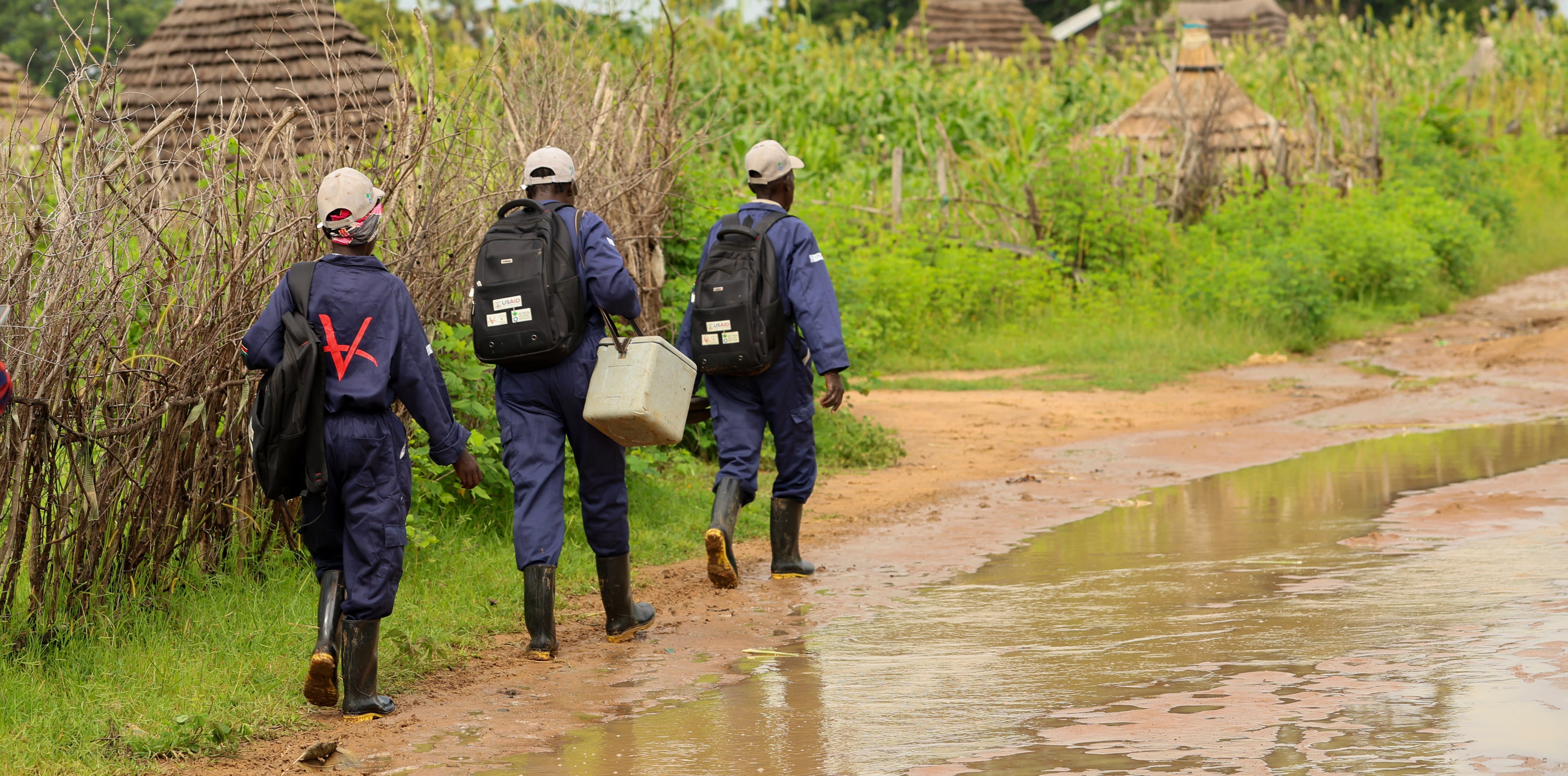 PHOTO: Three VWB-trained Community Animal Health Workers (CAHWs) walk down a muddy road in Aweil East, making their way to support the vaccination campaign.
PHOTO: Three VWB-trained Community Animal Health Workers (CAHWs) walk down a muddy road in Aweil East, making their way to support the vaccination campaign.
A Ripple Effect of Impact
The recent vaccination campaign is part of a larger story of success. Since its inception in 2021, the SURGE+MET project has:
- Vaccinated and treated over 208,114 livestock across South Sudan.
- Trained and equipped 200 CAHWs, ensuring ongoing veterinary services in underserved communities.
- Directly benefited 8,860 households, representing 53,162 individuals.
These achievements reflect the transformative power of investing in livestock health. They protect not only animals but also the livelihoods, nutrition, and future prospects of South Sudanese families.
Building a Resilient Future
Beyond the numbers, the campaign embodies hope and resilience. It underscores the importance of integrated approaches to humanitarian aid, combining immediate interventions with long-term capacity building. By strengthening local systems and empowering communities, VWB and its partners are laying the groundwork for sustainable development in South Sudan. Overall, the message is clear: healthy livestock mean healthy lives. Together, we can build a future where communities thrive through the interconnected health of animals, people, and the environment.
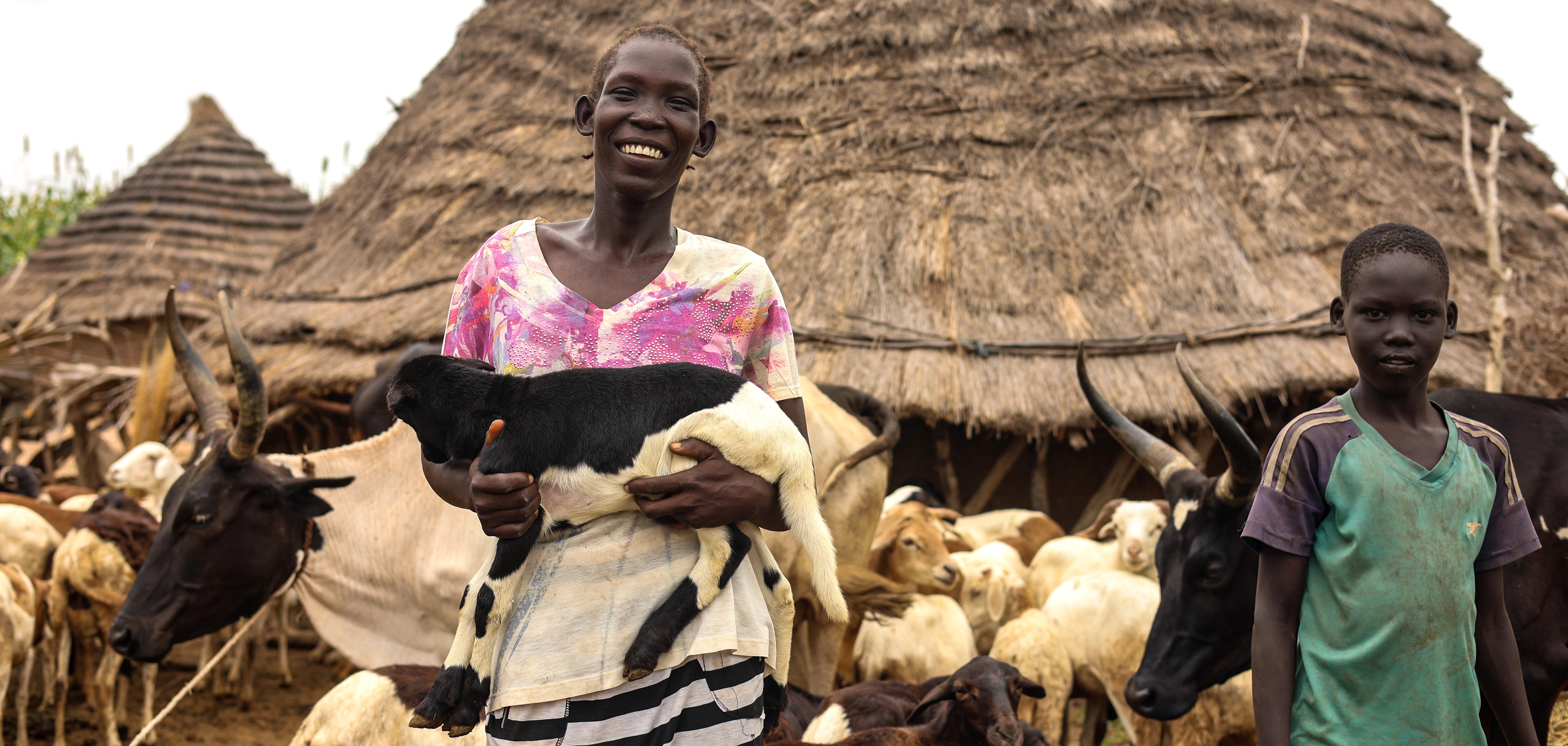 PHOTO: A mother and her son with their goats in Aweil East, strengthened through VWB’s livestock vaccination campaign.
PHOTO: A mother and her son with their goats in Aweil East, strengthened through VWB’s livestock vaccination campaign.
If you would like to help care for livestock and enhance the livelihoods of people across South Sudan, please consider donating, becoming a monthly donor, or supporting our Crisis Fund. Learn more. Thank you so much for your generosity and compassion.

